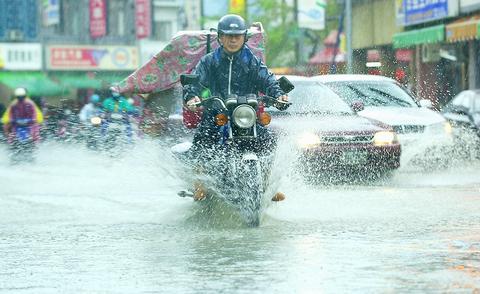Heavy rainfall in southern Taiwan yesterday disrupted traffic in the air and on the ground and added needed water to reservoirs.
An official of the Water Conservancy Agency of the Ministry of Economic Affairs said that certain areas in southern Taiwan have received more than 300mm of rain since Thursday afternoon.

PHOTO: CHANG CHONG-YI, TAIPEI TIMES
The water-collecting areas of the Tsengwen and Nanhua reservoirs in southern Taiwan had received 98.2mm and 136.7mm of rain, respectively, by noon yesterday.
The Feitsui and Shihmen reservoirs in northern Taiwan had accumulated 48.85mm and 38.6mm, respectively, by noon yesterday.
The water level at the Feitsui Reservoir stood at 134.24m, while that of the Shihmen Reservoir was 212.96m as of yesterday afternoon.
The rains will help relieve the drought in southern Taiwan, although much more rain is needed to fill the reservoirs in other parts of the country, the official said.
While the rain was good news for water officials, the precipitation, combined with strong winds, disrupted traffic in Kaohsiung City yesterday morning, prompting the city government to establish a natural disaster prevention center.
The rain has also caused problems for farmers in Kaohsiung and Pingtung counties, as rivers in the area flooded their farmland.
Some flights in Tainan, Kaohsiung and Taitung were delayed by strong winds and heavy rainfall yesterday morning.
The Tainan Airport was closed temporarily three times in the morning and afternoon. Seven flights were cancelled as a result.

Nipah virus infection is to be officially listed as a category 5 notifiable infectious disease in Taiwan in March, while clinical treatment guidelines are being formulated, the Centers for Disease Control (CDC) said yesterday. With Nipah infections being reported in other countries and considering its relatively high fatality rate, the centers on Jan. 16 announced that it would be listed as a notifiable infectious disease to bolster the nation’s systematic early warning system and increase public awareness, the CDC said. Bangladesh reported four fatal cases last year in separate districts, with three linked to raw date palm sap consumption, CDC Epidemic Intelligence

Two Taiwanese prosecutors were questioned by Chinese security personnel at their hotel during a trip to China’s Henan Province this month, the Mainland Affairs Council (MAC) said yesterday. The officers had personal information on the prosecutors, including “when they were assigned to their posts, their work locations and job titles,” MAC Deputy Minister and spokesman Liang Wen-chieh (梁文傑) said. On top of asking about their agencies and positions, the officers also questioned the prosecutors about the Cross-Strait Joint Crime-Fighting and Judicial Mutual Assistance Agreement, a pact that serves as the framework for Taiwan-China cooperation on combating crime and providing judicial assistance, Liang

Reports of Taiwanese going missing, being detained or interrogated, or having their personal liberties restricted in China increased about fourfold annually last year, the Mainland Affairs Council (MAC) said yesterday. Last year, 221 Taiwanese who traveled to China were reported missing, were detained and interrogated, or otherwise had their personal freedom restricted, up from 55 the previous year, the council said. Reopening group tours to China would be risky, as it would leave travelers with no way to seek help through official channels after Beijing shut down dialogue between the associations tasked with handling cross-strait tourism, the MAC said. Taipei’s Taiwan Strait Tourism

The manufacture of the remaining 28 M1A2T Abrams tanks Taiwan purchased from the US has recently been completed, and they are expected to be delivered within the next one to two months, a source said yesterday. The Ministry of National Defense is arranging cargo ships to transport the tanks to Taiwan as soon as possible, said the source, who is familiar with the matter. The estimated arrival time ranges from late this month to early next month, the source said. The 28 Abrams tanks make up the third and final batch of a total of 108 tanks, valued at about NT$40.5 billion